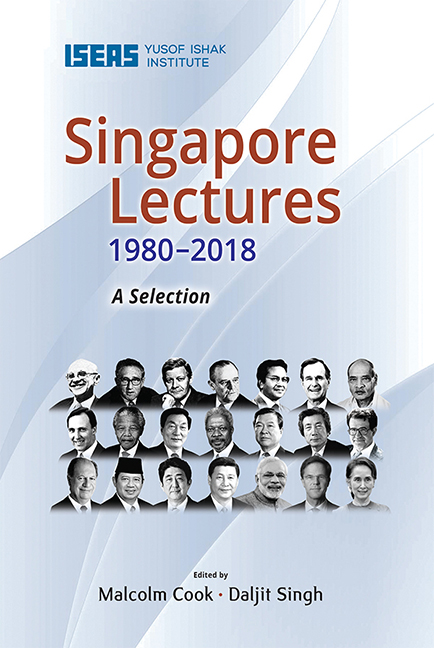Book contents
- Frontmatter
- Contents
- Introduction
- 1 The Invisible Hand in Economics and Politics
- 2 American Foreign Policy: A Global View
- 3 The Soviet Union: Challenges and Responses as Seen from the European Point of View
- 4 Trends in the International Financial System
- 5 Regionalism, Globalism and Spheres of Influence: ASEAN and the Challenge of Change into the 21st Century
- 6 US Policy in the Asia-Pacific Region: Meeting the Challenges of the Post-Cold War Era
- 7 India and the Asia-Pacific: Forging a New Relationship
- 8 Australia, Asia and the New Regionalism
- 9 South and Southern Africa into the Next Century
- 10 China and Asia in the New Century
- 11 Global Values: The United Nations and the Rule of Law in the 21st Century
- 12 Peace on the Korean Peninsula and East Asia
- 13 Japan and ASEAN in East Asia: A Sincere and Open Partnership
- 14 EU and Asia: Sharing Diversity in an Inter-regional Partnership
- 15 Global Challenges in the 21st Century: A View from Chile
- 16 Indonesia: The Challenge of Change
- 17 Japan and ASEAN, Always in Tandem: Towards a More Advantageous Win-Win Relationship through My “Three Arrows”
- 18 Forging a Strong Partnership to Enhance Prosperity of Asia
- 19 India’s Singapore Story
- 20 The Netherlands, Singapore, Our Regions, Our World: Connecting Our Common Future
- 21 Democratic Transition in Myanmar: Challenges and the Way Forward
- The Singapore Lecture Series
- The Editors
7 - India and the Asia-Pacific: Forging a New Relationship
Published online by Cambridge University Press: 09 October 2021
- Frontmatter
- Contents
- Introduction
- 1 The Invisible Hand in Economics and Politics
- 2 American Foreign Policy: A Global View
- 3 The Soviet Union: Challenges and Responses as Seen from the European Point of View
- 4 Trends in the International Financial System
- 5 Regionalism, Globalism and Spheres of Influence: ASEAN and the Challenge of Change into the 21st Century
- 6 US Policy in the Asia-Pacific Region: Meeting the Challenges of the Post-Cold War Era
- 7 India and the Asia-Pacific: Forging a New Relationship
- 8 Australia, Asia and the New Regionalism
- 9 South and Southern Africa into the Next Century
- 10 China and Asia in the New Century
- 11 Global Values: The United Nations and the Rule of Law in the 21st Century
- 12 Peace on the Korean Peninsula and East Asia
- 13 Japan and ASEAN in East Asia: A Sincere and Open Partnership
- 14 EU and Asia: Sharing Diversity in an Inter-regional Partnership
- 15 Global Challenges in the 21st Century: A View from Chile
- 16 Indonesia: The Challenge of Change
- 17 Japan and ASEAN, Always in Tandem: Towards a More Advantageous Win-Win Relationship through My “Three Arrows”
- 18 Forging a Strong Partnership to Enhance Prosperity of Asia
- 19 India’s Singapore Story
- 20 The Netherlands, Singapore, Our Regions, Our World: Connecting Our Common Future
- 21 Democratic Transition in Myanmar: Challenges and the Way Forward
- The Singapore Lecture Series
- The Editors
Summary
On 8 September 1994, Prime Minister of India P.V. Narasimha Rao gave the 13th Singapore Lecture after being welcomed by Senior Minister Lee Kuan Yew. Prime Minister Rao was the first Indian leader and second political leader from Asia to give a Singapore Lecture. The lecture focuses on India's historic and contemporary ties to East Asia and the importance of ASEAN to India. The lecture serves as a good foreshadowing of India's growing relationship with ASEAN as shown by India becoming a full ASEAN dialogue partner a year later and a founding member of the East Asia Summit in 2005.
Mr Chairman, Senior Minister Lee Kuan Yew, Mr Prime Minister, Excellencies, Ladies and Gentlemen. I am grateful to my friend and senior statesman Lee Kuan Yew for his kind remarks. This is a truly historic moment for all of us, not merely in a temporal, but also in a historical sense. Although my own association with Southeast Asia and Singapore goes back to a decade and a half, the ties that bind India and Southeast and East Asia are so old that they are still being fully traced by historians, who increasingly have to get the assistance of archaeologists.
Singapore has graciously hosted Alamkara, an exposition titled “Five Thousand Years of India”. It was conceived as a presentation not merely of the ancient Indian civilization but a reaffirmation of the ties that bound our ancestors together. You may be interested to know that even the name of your city is very common in India and I know at least two villages close to my own with the same name. And I myself carry part of your city in my own name. I am sure you cannot think of another guest so closely identified with you.
I was therefore not a little perplexed when I faced the task of drafting an address to this distinguished gathering on the “new relationship” India is forging with the Asia-Pacific. I suppose the connotation has something to do with the fact that in Asia, the industrial and technological revolution was heralded only late in this century, but the advances in development have been so rapid in recent decades or even years that it would be fair to say that it is not the reality that is changing, but change which is becoming a reality.
- Type
- Chapter
- Information
- Singapore Lectures 1980-2018 , pp. 107 - 123Publisher: ISEAS–Yusof Ishak InstitutePrint publication year: 2020

